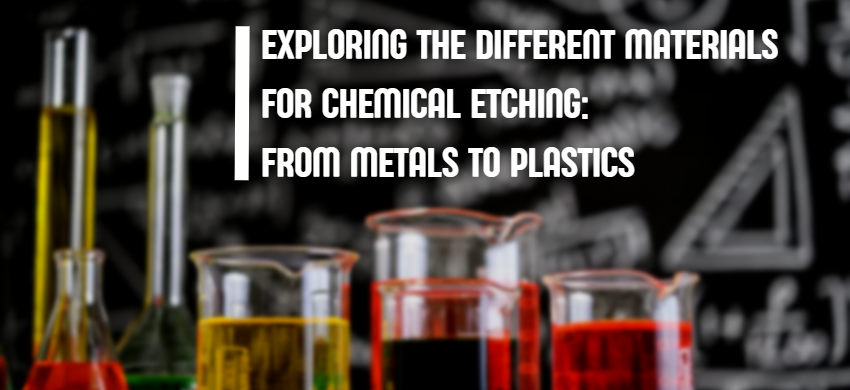UK-based suppliers, applicators and trainers. Call us today to get a free sample : 01604 644604


Chemical etching is a subtractive manufacturing method commonly referred to as "industrial etching" or "chemical milling." In order to achieve the appropriate shape, thickness, and detailed designs or geometric characteristics, it entails submerging or spraying metals with temperature-controlled chemicals.
Chemical etching enables manufacturers to produce metal parts with even the most complex and challenging designs while attaining great repeatability and reliable production quality.
Whereas practically any metal can be chemically etched, some metals are more amenable to the process than others. The industrial sector's desire for etching frequently concentrates on metals with particular characteristics for the same reason.
The distinctive quality of these materials guarantees that its procedures are developed in accordance with the expectations of its customers' markets.
Titanium is a popular material for chemical etching because of its strength, low weight, and high temperature capabilities. When etching titanium, the typical method entails employing an oxidising solution to selectively dissolve away the metal. Then a huge number of intricate components will be quickly etched from chemically-etched titanium.
The difficulty of etching titanium chemically is due to the material's chemical response in high heat and its protective oxidised layer, which develops when exposed to air.
This has significantly reduced the life of the machined components and rendered the traditional etching technique for Titanium chemical etching substance useless. Chemical etching is a solution that has been created using specialised equipment and process chemistry to solve the issues.
The best material for aerospace applications is aluminium chemical etching material since it not only has superior strength-to-weight ratios and corrosion-resistance compared to titanium, but it also has a higher fatigue limit. In addition to being an appealing feature, its high conductivity, malleability, and ductility make it a manufacturing weak point.
For instance, the flexibility of aluminium chemical etching substance results in wear and pick-up during milling, and it will solidify during punching. Due to its heat reflectivity, cutting with a laser is difficult, and because aluminium emits heat when photoetched, the resulting edges may have a rough texture.
The operator carefully processes the chosen region by chemical and photoresist etching during the etching process. Etching is defined by the preservation of material qualities, the production of parts with no burrs or stresses, a smooth shape, and no heat-affected zone.
For the same reasons, it offers a production alternative to conventional sheet metal processing methods that is affordable, extremely accurate, and quick (including stamping, laser, and water jet cutting)
Because of the variety of available grades and stainless steel's adaptability, it is widely employed in many industries, all of which profit from its burr and stress-free characteristics. Yet, because stainless steel is anti-corrosive, etching it can be a little challenging. To maximise client outcomes, it called for the use of experience and a large investment in processing technologies.
Corrosive chemicals are typically used in stainless steel etching to remove intricate forms from sheets of stainless steel metal. It is a reasonably precise processing technique that doesn't subject the material to mechanical stress while producing high precision levels of complexity.
The experience and etching proficiency of your chosen partner will determine the etching materials science, as was already discussed. Chemical etching and a number of additional etching services for metal and other materials are provided by TMN.
Through the use of cutting-edge chemical etching technology, TMN can produce engraved titanium parts with incredibly tight tolerances. Discover more about TMN's simple chemical procedure on the company website if you want to use their service.